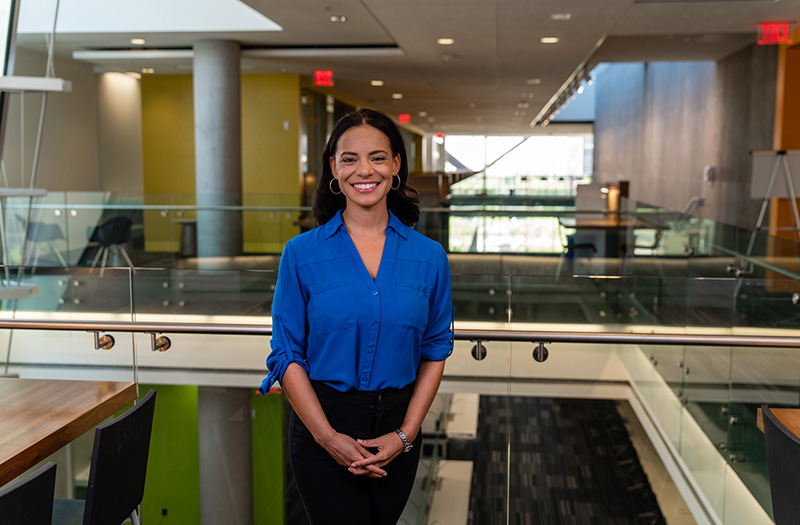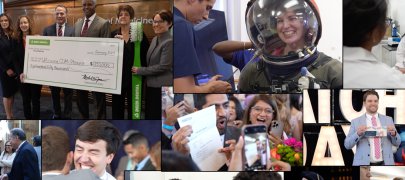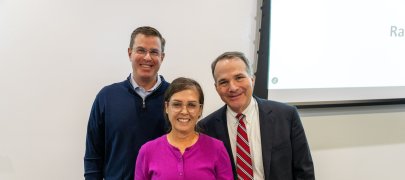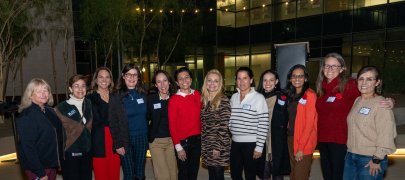
Women in Medicine: Trailblazers, Advocates and Leaders - Guadalupe Federico-Martinez, PhD

In honor of this year’s Women in Medicine and Science theme, “Women in Medicine: Trailblazers, Advocates and Leaders,” the College of Medicine – Phoenix has asked a few faculty to share their inspiring stories about female physicians or scientists who helped advance their career.
Guadalupe Federico-Martinez, PhD, is assistant dean, Faculty Affairs and Career Development at the University of Arizona College of Medicine – Phoenix. She is also assistant professor of Medicine for the Colleges of Medicine – Phoenix and Tucson. A graduate of the University of Arizona, she received a bachelor’s degree in political science, as well as master’s and doctoral degrees in higher education with a focus on career aspirations and one’s self-efficacy. Beginning in December 2007, she worked for the University of Arizona as a graduate researcher and teacher assistant at the UA College of Education’s Center for the Study of Higher Education under the mentorship of Regina Deil-Amen, PhD.
Prior to her role at the College of Medicine – Phoenix, Dr. Federico-Martinez was an assistant professor in the Department of Medicine in Tucson and worked as director of educational research and development in the vice chair for Education's Office. She served as a planning committee member for the Department of Medicine’s Physician’s Educational Development Program and both department- and college-level faculty mentoring programs. Within these programs she worked closely with residency and fellowship Graduate Medical Education directors and core teaching faculty as they cultivated a career in medical education. She also served as a departmental and college level education research mentor to the clinical scholars enrolled in leadership and teaching scholars programming.
Throughout her career, Dr. Federico-Martinez has contributed to academic medicine through publishing research articles, literature reviews and presenting peer-reviewed abstracts on faculty development and career mentoring for physician-scholars. Her work on physician-faculty examines how mentorship and organizational culture shape their self-efficacy relative to their current roles and evolving medical education research and teaching aspirations. For the last five years, she co-created a fourth-year medical student elective that has been featured nationally in AAMCNews Medical Education, Careers in Academic Medicine. She also presented the original curriculum of this course as a workshop at a 2018 Building the Next Generation of Academic Physician’s (BNGAP) pre-faculty national conference.
Dr. Federico-Martinez currently serves on committees at a national level as a sub-committee member of the AAMC’s Group on Faculty Affairs Research and Project Development Committee. In addition to teaching and service roles for the College of Medicine – Phoenix, she also serves as the College of Medicine – Tucson co-director of program evaluation for NIH-funded Programs to Increase Diversity Among Individuals Engaged in Health-Related Research (PRIDE R-25). In April 2019, she received the Dr. Maria Teresa Velez Outstanding Mentoring Award, which celebrated her outstanding commitment to mentoring staff, Summer Scrub participants, medical students and faculty at the University of Arizona.
Academic Medicine Is Becoming Inclusive of Social Scientists in Medical Education Training. How Did You Become a Leader In this Realm?
I am a social scientist by training in higher education and an academic in medicine for the last seven years. Social scientists are often educators and investigators, as well. Mostly, we are experts in the various dimensions related to adult education, such as teaching and educational research. We are becoming an essential part of medical education training and administration.
We are at a time where institutions are prioritizing clinical teaching techniques and understanding the learning environment influences not just trainee learning, but school finances, leadership decisions, faculty morale, recruitment and retention. As institutions mirror private sector entities, they too are engaging in strategic planning to remain competitive, have accountability to stakeholders and be efficient with resources in the current American knowledge-based economy. This is important to me because I study the behavior of international higher education institutions and the human behavior (learners, administrators, staffers, faculty, politicians) that shapes the academic and clinical cultures and practices within institutions.
I think my skill set and experience in education is valued here as the college evolves.
During my formal schooling, I had amazing male and female professors at the College of Education who encouraged us to take risks, think critically, challenge, investigate and use one’s knowledge and position to shape experiences, policies and careers of others. What I learned in field research and working at the College of Medicine and Education Office at the same time helped me apply educational concepts and theory to the academic medicine setting. There are few social scientists in the academic medicine field, let alone female professors in senior leadership roles with such expertise.
Who Are Your Mentors?
Early in my training, Dr. Deil-Amen was instrumental in passing investigative skills and networking. As I have advanced through my career in medicine and leadership, however, I needed to connect with professors and leaders who specifically advocate and coach women. Given that so few women have been available or at the top ranks in medicine, male colleagues are who I have turned to. Dr. Ken Knox, associate dean of Faculty Affairs and Development at the College of Medicine – Phoenix, has been one of the most influential mentors amongst my professional panel of career mentors in medicine. From my experience and exchanges with my mentor panel, I have learned the following convictions that I try to operate from:
- Speak truth to power to hold yourself accountable to the people you advocate for and lead. This attribute helps me persist and stay motivated in what I do here day-to-day.
- Value the positive role that men play in the careers of women. I have learned that given the demographics of academic medicine leadership, men still hold key power and decision-making positions. If we can continue to work together and sensitize male colleagues to the unique challenges that women face by illustrating for them what we experience through our lens, they can better advocate and help re-shape the academic and leadership pipeline.
Throughout the month of September, we will be celebrating and highlighting the important work of women scientists, clinicians, educators, mentors and leaders in academic medicine. They will share their empowering stories about female physicians and scientists who helped shape their careers in medicine and paved the way for the next generation of trailblazers in academic medicine.
About the College
Founded in 2007, the University of Arizona College of Medicine – Phoenix inspires and trains exemplary physicians, scientists and leaders to optimize health and health care in Arizona and beyond. By cultivating collaborative research locally and globally, the college accelerates discovery in a number of critical areas — including cancer, stroke, traumatic brain injury and cardiovascular disease. Championed as a student-centric campus, the college has graduated more than 900 physicians, all of whom received exceptional training from nine clinical partners and more than 2,700 diverse faculty members. As the anchor to the Phoenix Bioscience Core, which is projected to have an economic impact of $3.1 billion by 2025, the college prides itself on engaging with the community, fostering education, inclusion, access and advocacy.


